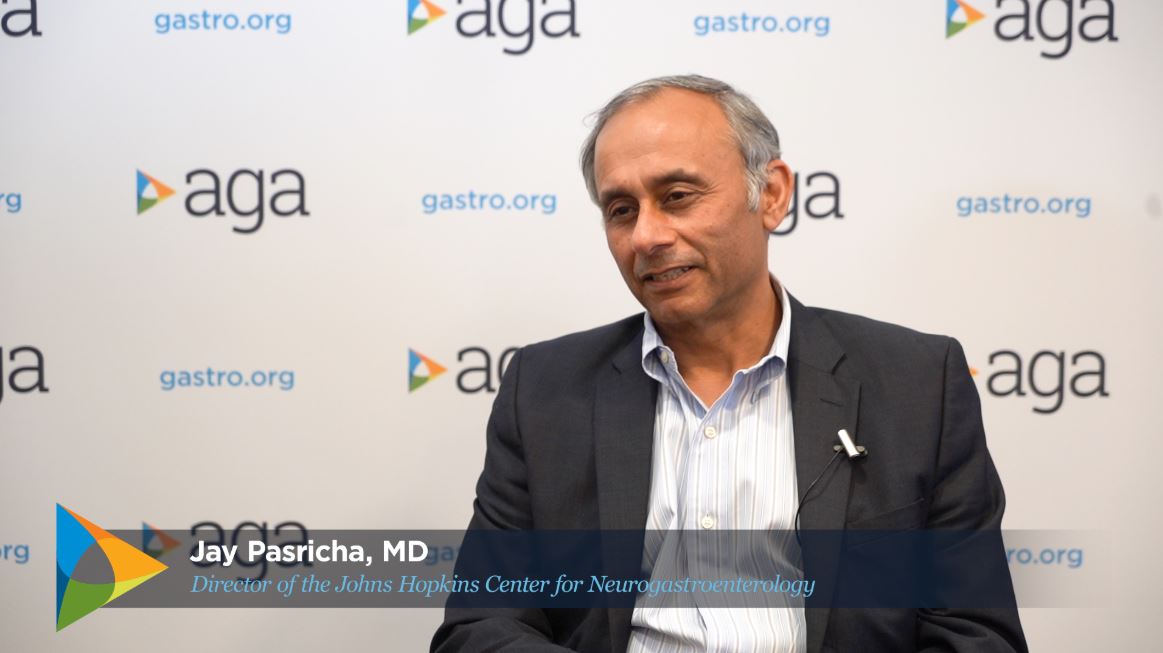User login

SAN FRANCISCO – Jay Pasricha, MD, director of the Johns Hopkins Center for Neurogastroenterology, in Baltimore, reminisced about the early days of the AGA Center for GI Innovation and Technology in an interview at the AGA Tech Summit. “I was a founder,” he said, “along with Joel Brill and others.”
He goes back to when the idea was first pitched to the AGA Institute Council in 2009 as a technology center. He recalls that the first summit was held in Palo Alto, Calif., and that it was a “terrific success” because it filled a void. Dr. Pasricha said that the CGIT has fulfilled most if not all of its early expectations and – in some cases – went beyond expectations. Importantly, it transformed how people thought about GI as a specialty – GI was considered a risk-averse specialty previously. CGIT helped to develop relationships with many stakeholders, including the Food and Drug Administration. Dr. Pasricha predicts that CGIT will continue to do well because of its leadership and because AGA is completely invested in its success.

SAN FRANCISCO – Jay Pasricha, MD, director of the Johns Hopkins Center for Neurogastroenterology, in Baltimore, reminisced about the early days of the AGA Center for GI Innovation and Technology in an interview at the AGA Tech Summit. “I was a founder,” he said, “along with Joel Brill and others.”
He goes back to when the idea was first pitched to the AGA Institute Council in 2009 as a technology center. He recalls that the first summit was held in Palo Alto, Calif., and that it was a “terrific success” because it filled a void. Dr. Pasricha said that the CGIT has fulfilled most if not all of its early expectations and – in some cases – went beyond expectations. Importantly, it transformed how people thought about GI as a specialty – GI was considered a risk-averse specialty previously. CGIT helped to develop relationships with many stakeholders, including the Food and Drug Administration. Dr. Pasricha predicts that CGIT will continue to do well because of its leadership and because AGA is completely invested in its success.

SAN FRANCISCO – Jay Pasricha, MD, director of the Johns Hopkins Center for Neurogastroenterology, in Baltimore, reminisced about the early days of the AGA Center for GI Innovation and Technology in an interview at the AGA Tech Summit. “I was a founder,” he said, “along with Joel Brill and others.”
He goes back to when the idea was first pitched to the AGA Institute Council in 2009 as a technology center. He recalls that the first summit was held in Palo Alto, Calif., and that it was a “terrific success” because it filled a void. Dr. Pasricha said that the CGIT has fulfilled most if not all of its early expectations and – in some cases – went beyond expectations. Importantly, it transformed how people thought about GI as a specialty – GI was considered a risk-averse specialty previously. CGIT helped to develop relationships with many stakeholders, including the Food and Drug Administration. Dr. Pasricha predicts that CGIT will continue to do well because of its leadership and because AGA is completely invested in its success.
REPORTING FROM 2019 AGA TECH SUMMIT
